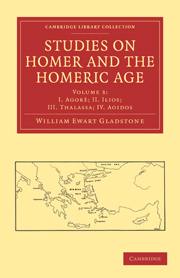EXCURSUS I
Parentage and Extraction of Minos
Published online by Cambridge University Press: 05 October 2010
Summary
IN former portions of this work, I have argued from the name and the Phoenician extraction of Minos, both to illustrate the dependent position of the Pelasgian race in the Greek countriesa, and also to demonstrate the Phoenician origin of the Outer Geography of the Odysseyb. But I have too summarily disposed of the important question, whether Minos was of Phoenician origin, and of the construction of the verse II. xiv. 321. This verse is capable grammatically of being so construed as to contain an assertion of it; but upon further consideration I am not prepared to maintain that it ought to be so interpreted.
The Alexandrian critics summarily condemned the whole passage (II. xiv. 317–27), in which Jupiter details to Juno his various affairs with goddesses and women. ‘This enumeration,’ says the Scholiast (A) on verse 337, ‘is inopportune, for it rather repels Juno than attracts her: and Jupiter, when greedy, through the influence of the Cestus, for the satisfaction of his passion, makes a long harangue’ Heyne follows up the censure with a yet more sweeping condemnation. Sanè absurdiora, quam hos decem versus, vix unquam ullus commentus est rhapsodusc.
- Type
- Chapter
- Information
- Studies on Homer and the Homeric Age , pp. 344 - 348Publisher: Cambridge University PressPrint publication year: 2010First published in: 1858



